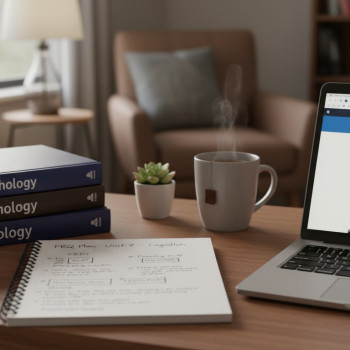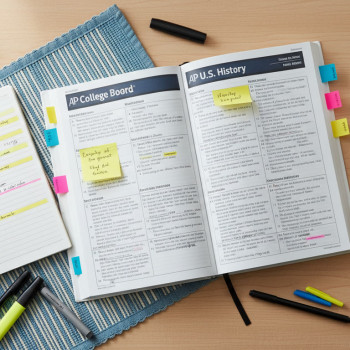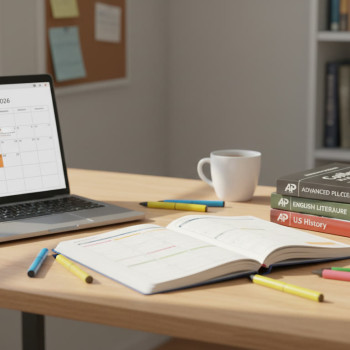Introduction: You’re Not Alone — This Is a Team Effort
Seeing the calendar fill up with AP exams one after another can feel like standing at the base of a steep hill. For a student, it’s a parade of high-stakes moments; for parents, it can look like a juggling act between logistics, emotional support, and keeping the household running. But here’s the good news: back-to-back exam weeks are survivable — and your family can come out of the other side with less frayed nerves and more confidence. This post is a friendly, practical playbook for parents who want to help without taking over, and how small family shifts can multiply into real results.

Why Back-to-Back AP Exams Are Special
AP exam weeks are a unique kind of marathon. Unlike one-off tests, back-to-back scheduling adds cumulative fatigue, emotional momentum, and the risk of momentum swinging the wrong way if one exam doesn’t go as planned. It’s not only about content mastery — it’s about timing, recovery, and small rituals that keep your teen steady for the whole stretch.
Think of the week as a sequence of sprints with short recovery periods. Your job as a parent is to help your child keep their energy, their focus, and their perspective.
Common family stressors during exam week
- Logistics: alarm schedules, transportation, and quiet spaces.
- Nutrition: missed breakfasts or low-energy snacks.
- Emotional pressure: perfectionism, fear after a tough exam, sibling dynamics.
- Sleep disruption: late-night revision vs. need for rest.
- Household noise and unexpected demands.
Before Exam Week: Create a Calm Foundation
Preparation starts well before the first test. The calmer the pre-week environment, the easier it is to maintain momentum.
1. Build a realistic schedule together
Sit down with your child and map out exam dates, times, travel, and any school commitments. Include short recovery windows after each exam — even 30–60 minutes of intentional rest makes a difference. Put this schedule somewhere visible: fridge, a shared calendar app, or a printed copy on their study wall.
2. Pack an Exam-Ready Kit
Make a checklist and prepare a kit together a few days before the first test. Items to include:
- Required materials: student ID, approved calculator, pencils, erasers, pens (check the exam rules for specifics).
- Comfort items: a thin sweater, bottled water, a small snack, and tissues.
- Reference reminders: a short handwritten list of last-minute calming cues — breathing steps, a brief formula sheet of mnemonic devices (not prohibited content), or a cue card for time-management reminders.
3. Agree on a study plan that preserves sleep
Help your teen set a schedule that prioritizes sleep. If they insist on late-night studying, negotiate a compromise: intensive evening review for short blocks (25–40 minutes) followed by a firm wind-down period. Consider using a simple timer and the Pomodoro technique to keep sessions focused without bleeding into sleep time.
During Exam Week: Practical Routines That Reduce Friction
Once exams begin, the goal is to remove daily friction so your child can conserve mental energy for test-taking. Here are hands-on routines that families can adopt immediately.
Morning Routines: Start the Day with Purpose
- Wake-up buffer: Aim to wake your child 60–75 minutes before travel or the exam start time to avoid rush and anxiety.
- Breakfast strategy: Offer a balance of complex carbs, protein, and a little healthy fat. Examples: oatmeal with nuts and fruit, whole-grain toast with peanut butter and banana, or Greek yogurt with berries. Avoid heavy, greasy meals that can cause sluggishness.
- 10-minute check-in: A calm, affirming five- to ten-minute conversation can set the tone — ask a practical question, avoid mini-lectures, and offer encouragement.
Household Adjustments During the Day
Keep the home environment predictable. Small household rules can prevent a cascade of interruptions:
- Quiet hours before and after exams.
- Limit loud chores (vacuuming, lawn mowing) during morning exams.
- Post-exam decompression windows where your child can nap or do a relaxing activity.
Midday and Post-Exam Recovery
After an intense exam, the brain needs a gentle reset. Encourage a mini-recovery: a 20–40 minute walk, a brief nap (20–30 minutes), or a focused leisure activity that’s not screen-stimulating (light reading, stretching, listening to an album). Avoid immediately plunging into the next subject’s heavy study unless timelines require it — pacing matters.
Study Tactics That Work During Rapid-Fire Exam Weeks
When exams are back-to-back, study tactics should be efficient, high-yield, and forgiving.
Focus on active recall and short, targeted practice
- Flashcards for key terms or equations: 10–20 minutes is often enough to keep knowledge fresh.
- Practice questions under timed conditions: one or two short sets to preserve test pacing awareness.
- Teach-back method: ask your child to explain a concept aloud to you or a sibling — explaining reinforces memory and reveals gaps.
Rotate subjects wisely
If your teen has two exams in consecutive days, alternate light review with active practice. For example, if a heavy-concept exam is in the morning, reserve the evening for targeted flashcards in the next subject rather than trying to relearn full chapters.
Nutrition, Sleep, and Movement: The Nonnegotiables
During exam week, the basics are your secret superpowers. Food, sleep, and movement have outsized effects on cognitive performance.
Quick meal-and-snack blueprint
| Meal | What To Serve | Why It Helps |
|---|---|---|
| Breakfast | Oatmeal with nuts and berries; whole-grain toast with egg | Steady energy and protein sustain focus |
| Snack (pre-exam) | Banana, yogurt, or a small trail mix | Quick glucose plus satiety without heaviness |
| Lunch | Lean protein, whole grains, and vegetables (e.g., turkey sandwich on whole grain, salad) | Prevents afternoon energy crashes |
| Post-exam snack | Hummus with carrots, smoothie, or fruit and cheese | Aids recovery and replenishes energy |
Sleep: the performance enhancer
Encourage consistent bedtimes during exam week. Night-before sleep is crucial, but so are the nights leading up to the exams. If your child is tempted to cram, remind them: memory consolidation happens during sleep — sometimes what they skip in one late-night session returns to them after a good night’s rest.
Movement breaks that actually help
Short aerobic activity — a brisk 10–20 minute walk or a quick set of jumping jacks and stretches — improves attention and mood. Make these part of the schedule between exams or after a study block.
Emotional Support: Language That Calms and Connects
Parents often want to help emotionally but worry about saying the wrong thing. The right language is simple: validate, normalize, and offer control where possible.
Words that help
- Validation: “I can see you worked hard for this. That’s what matters.”
- Perspective: “One test doesn’t define you.”
- Control cues: “What one small thing can I do right now to make today easier?”
When an exam feels like a setback
If your child comes out of an exam feeling defeated, pause the analysis. Offer a listening ear and a short recovery ritual: a walk, a favorite snack, or a calm playlist. Once they’re settled, help them refocus on the next steps: what to review that’s high-yield and how to preserve energy for the next exam.
Practical Checklists for Parents
Here are two quick checklists you can copy, print, or screenshot.
Pre-Week Family Checklist
- Confirm exact AP exam dates and times and mark them on a shared calendar.
- Pack two exam kits: one for the car/school bag, one as a backup at home.
- Plan simple meals and snacks for the week; pre-prepare items where possible.
- Set quiet hours and inform other family members/kids about the schedule.
- Discuss contingency plans for transportation and unforeseen delays.
Daily Parent-to-Do List During Exams
- Confirm wake-up time and travel arrangements the night before.
- Provide a balanced breakfast and a packed snack.
- Offer a 5–10 minute emotional check-in pre-exam.
- Arrange a recovery window post-exam (nap or walk).
- Limit house noise and chores on exam mornings.
When to Bring in Extra Help: Tutoring and Tailored Support
Sometimes what a student needs is an efficient, targeted review rather than more hours of solo study. That’s where personalized tutoring can be a difference-maker. Short, focused sessions with an expert tutor can shore up weak spots, practice pacing, and build test-taking confidence — especially in the days before a high-priority exam.
If you’re considering tutoring during exam season, look for help that offers:
- 1-on-1 guidance tailored to exam timing and goals.
- Customized study plans that map to the actual exam schedule.
- On-demand resources and quick, exam-specific practice problems.
- Insight into pacing and common pitfalls for AP-style questions.
For families trying to balance home routines with targeted academic help, services like Sparkl can fit naturally: short, expert sessions that focus on the most actionable areas, plus AI-driven insights to pinpoint where study time will be most effective. When used sparingly and strategically during back-to-back weeks, targeted tutoring can reduce last-minute panic and boost confidence.
Realistic Expectations: Manage Outcomes Without Crushing Motivation
AP exams are important, but they are not the only measure of your child’s potential. Remind your teen of the long game: these scores can open doors, but they are one of many factors colleges consider. Foster a mindset of progress over perfection. Celebrate effort, resilience, and the ability to recover.
How to talk about scores afterward
- Focus on learning: “What did you learn about your study habits?”
- Celebrate attempts: “You showed up and gave it your best.”
- Plan forward: “Here’s one practical thing to try next time.”
Sample Two-Exam Back-to-Back Day Family Plan
Below is an example day for a student with two AP exams on consecutive days — adapt the times and activities to your schedule.
| Time | Activity | Why It Helps |
|---|---|---|
| 6:30 AM | Wake-up, light stretching, wash up | Gentle activation; avoids rushed start |
| 7:00 AM | Breakfast — protein and whole grains | Sustained energy for testing |
| 7:30 AM | Pack kit, quick calm check-in | Logistics taken care of; confidence boost |
| Exam time | Test | Execution |
| Post-exam + 30–45 min | Recovery: walk, snack, or 20-min nap | Restores focus and reduces stress |
| Evening | Light targeted review for next-day subject or short tutoring session | Keeps memory fresh without burning out |
| 10:00 PM | Wind-down and lights out | Preserves sleep for cognitive recovery |
Small Rituals That Make a Big Difference
Rituals are psychological anchors. They’re simple, repeatable actions that reduce decision fatigue and give structure to high-stress days. Here are a few to try:
- Pre-exam mantra: a short phrase like “Breathe, read, plan, answer.”
- Post-exam check-in: five minutes of nonjudgmental listening at home.
- A family “decompression” snack or walk together after the first exam to rebuild morale.
When Things Go Off Script
Delays, misunderstandings, or an unexpectedly hard exam can shake anyone. Have a simple contingency plan: transport alternatives, a contact person at school, and an agreed-upon emotional response so you don’t overreact in the moment. Practice calm problem-solving language: “Okay, what happened? What’s the next practical step?”
Wrapping Up: After the Week
When the last exam is finished, the primary job as a parent is to create space for recovery and reflection. Celebrate completion — even with small rituals like a special dinner, a family outing, or a favorite movie night. Encourage a low-stakes conversation about what worked and what didn’t so you can build a smarter plan next time.
And remember: sometimes the best help is quiet support. Your calm presence, consistent meals, steady logistics, and a few well-timed pep talks will mean more than any last-minute cram session.

Final Notes: Practical, Compassionate, and Prepared
Back-to-back AP exam weeks are demanding, but they’re also manageable. With thoughtful scheduling, nutrition, sleep, targeted study, and emotional steadiness, families can dramatically reduce stress and improve performance. If your child needs extra, focused help during this time, consider short, strategic tutoring sessions that provide 1-on-1 guidance, tailored study plans, and expert pacing tips to use in the days before a big exam. Small investments in preparation can yield big returns in confidence.
Above all, lead with perspective. Your teenager is learning more than subject matter — they’re learning resilience, time management, and how to perform under pressure. Those are life skills you and your family will carry long after the exam week ends.
Quick Takeaway
Plan logistics early, prioritize sleep and meals, use targeted study tactics, build short recovery rituals, and keep emotional support calm and practical. You don’t have to fix everything — showing up consistently does most of the work.
Wishing your family calm energy and steady focus. You’ve got this — one day, one exam, one supportive moment at a time.


















No Comments
Leave a comment Cancel